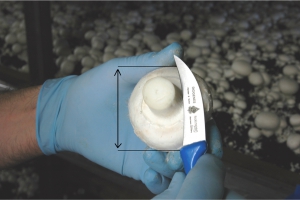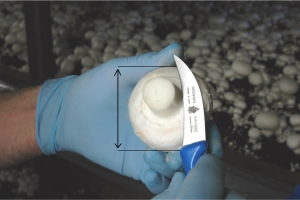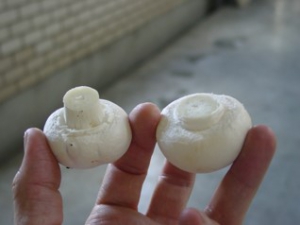Picking and calibration
Generally picking is considered by many as a low education job. But on the other hand, we rely on our picking force to deliver a good quality mushroom, meeting the customer demands. No bruised mushrooms, no nail or knife damage, right stem length, straight cut stem, no weak mushrooms in the punnet and for all, the right size. And that is where many things go wrong. It is fairly easy to learn the pickers the right way of picking. Twist and do not pull. Do not take to many mushrooms in one hand so they do not get damaged and put them caps up into the punnet. But getting the calibration right is a constant struggle. Pickers tend to have the habit to pick too small and this will cost you money. They simply pick the mushrooms that were meant to be picked tomorrow. An extra thing to that is that pickers lose the bonus while working really hard.
For the right calibration there are many tools like fruit grading rings, grading cards and other different tools. But the easiest tool they have in their hands: the knife.
The knife most used in mushroom growing is the curved knife and the length of the blade is exactly 60 mm. The calibration most wanted on many farms is 55 to 60 mm. Generally, this size is picked first before thinning out. And this is just the size of mushroom that is as wide as the length of their knife. They just have to keep the knife just above the mushrooms to judge the size. This way the mushrooms can be calibrated before they are picked and they will not be damaged by any other form of grading tools. The rings only let mushrooms through which are small enough. The bigger mushrooms get stuck and will be damaged. But the mushrooms that go through easily are too small and that is the calibration the picker will harvest. By using the knife not only there will be no damage but it is also faster.
If a smaller calibration is harvested like a 40 mm mushroom, a line can be made on the blade with a marking pen. Especially new pickers will be very fast in learning this trick. By banning the calibration rings also, the hygiene on the farm is served. Because these rings are hard to clean and experience learns that they are always dirty and are taken from room to room.
Give it a try and your harvesting staff will be happy.
Picking and calibration
Generally picking is considered by many as a low education job. But on the other hand, we rely on our picking force to deliver a good quality mushroom, meeting the customer demands. No bruised mushrooms, no nail or knife damage, right stem length, straight cut stem, no weak mushrooms in the punnet and for all, the right size. And that is where many things go wrong. It is fairly easy to learn the pickers the right way of picking. Twist and do not pull. Do not take to many mushrooms in one hand so they do not get damaged and put them caps up into the punnet. But getting the calibration right is a constant struggle. Pickers tend to have the habit to pick too small and this will cost you money. They simply pick the mushrooms that were meant to be picked tomorrow. An extra thing to that is that pickers lose the bonus while working really hard.
For the right calibration there are many tools like fruit grading rings, grading cards and other different tools. But the easiest tool they have in their hands: the knife.
The knife most used in mushroom growing is the curved knife and the length of the blade is exactly 60 mm. The calibration most wanted on many farms is 55 to 60 mm. Generally, this size is picked first before thinning out. And this is just the size of mushroom that is as wide as the length of their knife. They just have to keep the knife just above the mushrooms to judge the size. This way the mushrooms can be calibrated before they are picked and they will not be damaged by any other form of grading tools. The rings only let mushrooms through which are small enough. The bigger mushrooms get stuck and will be damaged. But the mushrooms that go through easily are too small and that is the calibration the picker will harvest. By using the knife not only there will be no damage but it is also faster.
If a smaller calibration is harvested like a 40 mm mushroom, a line can be made on the blade with a marking pen. Especially new pickers will be very fast in learning this trick. By banning the calibration rings also, the hygiene on the farm is served. Because these rings are hard to clean and experience learns that they are always dirty and are taken from room to room.
Give it a try and your harvesting staff will be happy.
K.I.S.S.
A good start for a blog just around Spring time. But the meaning is different.
It just means: Keep It Super Simple.
On many farms I assist in the picking instruction and the complaint most often heard is that the pickers do not listen. This is not entirely true. They do listen but they do not store it. They are thinking of many things and the mushrooms is not one of them.
So it is up to the supervisor or trainer to make sure the information gets through. She (or he) first has to get to know the picker. Then decide what method can be used. The best supervisor changes her role according to the person she talks to. She can be a teacher, a mother or your worst nightmare if needed. Depending on the person and the situation. But she knows what is going on in the mind of the picker. For the picker money and nice work is important. But they have no notice of how mushrooms grow and how to pick more kilo’s per m². They want to pick fast because most of the time their bonus is related to pick rate. But often they do not realise that it is not about working fast but about working smart. And a good instruction can help with that.
How to do a thing like that in a practical situation?
Let’s say stems need to be longer.
First explain to a picker that a longer stem can give them up to 10% higher pick rate without working faster. Just look at the stem and do not cut it of completely. Then translate the 10% extra to a 10% higher salary. The farm by the way has a 10% higher production. If they understand that, the power is in repeating. Not just in spoken word but also in visual signs. Make a project of this. For one complete week only instruct on stem length in the rooms and do this on individual level. So no shouting through the room but address every picker personally. The next part is a good photo which is shown for a week on all possible places. In the canteen, on the tables, in the corridor and even in the toilets. Just for a week because after a week they do not see the photo anymore. The next week another subject is chosen.
And for the supervisor: the power is in repeating. Tell them once, twice and keep going on. If the pickers see you, they immediately think of stem length. This way it is imprinted in their way of thinking and it is much easier to have success.
So Keep It Super Simple and act like a parrot.
























